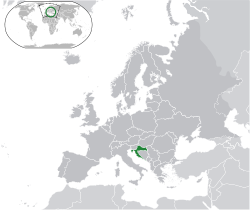Gotovina Calls Croatian Serbs To Return
By Boris Pavelic
In a short interview given to the Serbian newspapers Kurir, Ante Gotovina called on all Croatian Serbs who fled Operation Storm [Oluja] in 1995 to return to their pre war homes.
“They are citizens of Croatia, this is their homeland in the same way it is mine… This is their home and they should be here if they want to,” said Gotovina.

The Croatian military operation Storm was launched in order to recover territory seized by Serbian rebel forces at the start of the war in Croatia. Over 200,000 Serbs fled Croatia immediately after Operation Storm.
Speaking to journalists in Vukovar on Saturday, the Croatian president, Ivo Josipovic, said that “it is important that the generals are back in Croatia” adding that “according to the court, the defence of Croatia and Operation Storm were not criminal acts”.
Josipovic repeated that after Operation Storm war crimes were committed and that Croatia “has to do everything to prosecute those crimes”.
He also reminded that Croatia “started not one, but several war crimes trials against members of its army”.
In a TV interview little bit later, Josipovic refused to comment on the reaction of the Serbian president Tomislav Nikolic.
He added “Croatia has the obligation to work towards reconciliation”, expressing hope that the situation could improve during Nikolic’s mandate.
“But for now, about the war in Croatia, especially about Vukovar, we really cannot agree”, Josipovic said.
Josipovic, and the Croatian Prime Minister, Zoran Milanovic, took part in a march on Sunday commemorating the 21st anniversary of the fall of Vukovar on November 19 to the Serbian forces.
Vukovar was the first town in Europe to be destroyed by fighting since the end of World War II.
In 1991, the Yugoslav People’s Army, JNA, and Serbian paramilitary units encircled the Croatian town of Vukovar following Croatia’s declaration of independence from Yugoslavia.
More than 60 thousand people took part in the five kilometre march from the Vukovar hospital, from which Serbian forces took the patients to be executed, to a memorial cemetery where they lit candles and laid wreaths for those killed during and after the town’s three-month siege.
“Vukovar is the symbol of heroism and tragedy, but from that tragedy new chance emerges for the city, to become not only the city of sacrifice, but the city of reconciliation and togetherness,” said Josipovic.
One of the buildings destroyed during the war has been reconstructed, with the EU’s financial help, in order to become the Centre for Peace.
The chief of EU delegation to Croatia, Paul Vandoren, also reminded that Vukovar has a ”multiethnic history”.
“More than twenty different nations live here. The reconstruction of destroyed heritage is the contribution to European model of reconciliation, whose motto is ‘united in diversity’. That’s one of the basic principles of the European Union,” Vandoren said.

One observation I’d like to make; ICTY court documents show that the vast majority of Serbs (both soldiers and civilians) left BEFORE the Operation Storm began and not after as stated. Any crimes that took place by individuals (both soldiers and returning civilians) should be punsihed but such statements only aim to de-legitimise the operation as a whole which is definitely not correct.